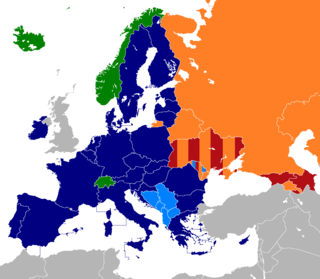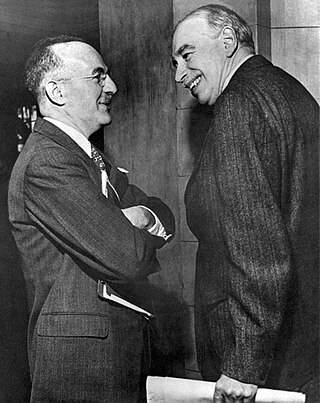
A free trade area is the region encompassing a trade bloc whose member countries have signed a free trade agreement (FTA). Such agreements involve cooperation between at least two countries to reduce trade barriers, import quotas and tariffs, and to increase trade of goods and services with each other. If natural persons are also free to move between the countries, in addition to a free trade agreement, it would also be considered an open border. It can be considered the second stage of economic integration.
The General Agreement on Tariffs and Trade (GATT) is a legal agreement between many countries, whose overall purpose was to promote international trade by reducing or eliminating trade barriers such as tariffs or quotas. According to its preamble, its purpose was the "substantial reduction of tariffs and other trade barriers and the elimination of preferences, on a reciprocal and mutually advantageous basis."

The World Trade Organization (WTO) is an intergovernmental organization headquartered in Geneva, Switzerland that regulates and facilitates international trade. Governments use the organization to establish, revise, and enforce the rules that govern international trade in cooperation with the United Nations System. The WTO is the world's largest international economic organization, with 166 members representing over 98% of global trade and global GDP.

A trade agreement is a wide-ranging taxes, tariff and trade treaty that often includes investment guarantees. It exists when two or more countries agree on terms that help them trade with each other. The most common trade agreements are of the preferential and free trade types, which are concluded in order to reduce tariffs, quotas and other trade restrictions on items traded between the signatories.

The Central European Free Trade Agreement (CEFTA) is an international trade agreement between countries mostly located in Southeastern Europe. Founded by representatives of Poland, Hungary and Czechoslovakia, CEFTA in 2006 expanded to Albania, Bosnia and Herzegovina, Bulgaria, Croatia, Moldova, Montenegro, North Macedonia, Romania, Serbia, Slovenia and Kosovo.
The Uruguay Round was the 8th round of multilateral trade negotiations (MTN) conducted within the framework of the General Agreement on Tariffs and Trade (GATT), spanning from 1986 to 1993 and embracing 123 countries as "contracting parties". The Round led to the creation of the World Trade Organization, with GATT remaining as an integral part of the WTO agreements. The broad mandate of the Round had been to extend GATT trade rules to areas previously exempted as too difficult to liberalize and increasingly important new areas previously not included. The Round came into effect in 1995 with deadlines ending in 2000 under the administrative direction of the newly created World Trade Organization (WTO).
The Lomé Convention is a trade and aid agreement between the European Economic Community (EEC) and 71 African, Caribbean, and Pacific (ACP) countries, first signed in February 1975 in Lomé, Togo.
The World Trade Organization's Ministerial Conference of 1996 was held in Singapore on December 9 - December 13, 1996. The inaugural meeting for the organisation since its formation. The event was hosted by the government of Singapore at the Singapore International Convention and Exhibition Centre in Suntec City.

At present, there are six multi-lateral free trade areas in Europe, and one former free trade area in recent history. Note that there are also a number of bilateral free trade agreements between states and between trade blocks; and that some states participate in more than one free trade area.
A preferential trade area is a trading bloc that gives preferential access to certain products from the participating countries. This is done by reducing tariffs but not by abolishing them completely. It is the first stage of economic integration.
A free trade agreement (FTA) or treaty is an agreement according to international law to form a free-trade area between the cooperating states. There are two types of trade agreements: bilateral and multilateral. Bilateral trade agreements occur when two countries agree to loosen trade restrictions between the two of them, generally to expand business opportunities. Multilateral trade agreements are agreements among three or more countries, and are the most difficult to negotiate and agree.

The European Commissioner for Trade is the member of the European Commission responsible for the European Union's common commercial policy.
The original members of theWorld Trade Organization are the parties to the General Agreement on Tariffs and Trade (GATT) after ratifying the Uruguay Round Agreements, and the European Communities. They obtained this status at the entry into force on 1 January 1995 or upon their date of ratification. All other members have joined the organization as a result of negotiation, and membership consists of a balance of rights and obligations. The process of becoming a World Trade Organization (WTO) member is unique to each applicant country, and the terms of accession are dependent upon the country's stage of economic development and the current trade regime.
This is a timeline of the World Trade Organization (WTO).
The Ministerial Conference is the top decision making body of the World Trade Organization (WTO). There have been twelve ministerial conferences from 1996 to 2022, usually every two years.

The Information Technology Agreement (ITA) is a plurilateral agreement enforced by the World Trade Organization (WTO) and concluded at the WTO's Singapore Ministerial Conference in 1996. The agreement was set out in the Ministerial Declaration on Trade in Information Technology Products issued at the conference, and entered into force 1 July 1997. The declaration referred to "the key role of trade in information technology products in the development of information industries and in the dynamic expansion of the world economy".

The Agreement on Government Procurement (GPA) is a plurilateral agreement under the auspices of the World Trade Organization (WTO) which regulates the procurement of goods and services by the public authorities of the parties to the agreement, based on the principles of openness, transparency and non-discrimination.

The Global System of Trade Preferences among Developing Countries (G.S.T.P) is a preferential trade agreement, currently encompassing 42 members ("participants"), signed on 13 April 1988 with the aim of increasing trade between developing countries. It was negotiated within the framework of the United Nations Conference on Trade and Development (UNCTAD). The Agreement entered into force on 19 April 1989 and was notified to the then General Agreement on Tariffs and Trade (GATT), predecessor of the World Trade Organization (WTO), on 25 September 1989. The 42 members of GSTP include 7 LDCs as well.

The World Trade Organization (WTO) is an intergovernmental organization which regulates international trade. The WTO officially commenced on 1 January 1995 under the Marrakesh Agreement, signed by 123 nations on 15 April 1994, replacing the General Agreement on Tariffs and Trade (GATT), which commenced in 1948. The WTO deals with regulation of trade between participating countries by providing a framework for negotiating trade agreements and a dispute resolution process aimed at enforcing participants' adherence to WTO agreements, which is signed by representatives of member governments and ratified by their parliaments. Most of the issues that the WTO focuses on derive from previous trade negotiations, especially from the Uruguay Round (1986–1994).










